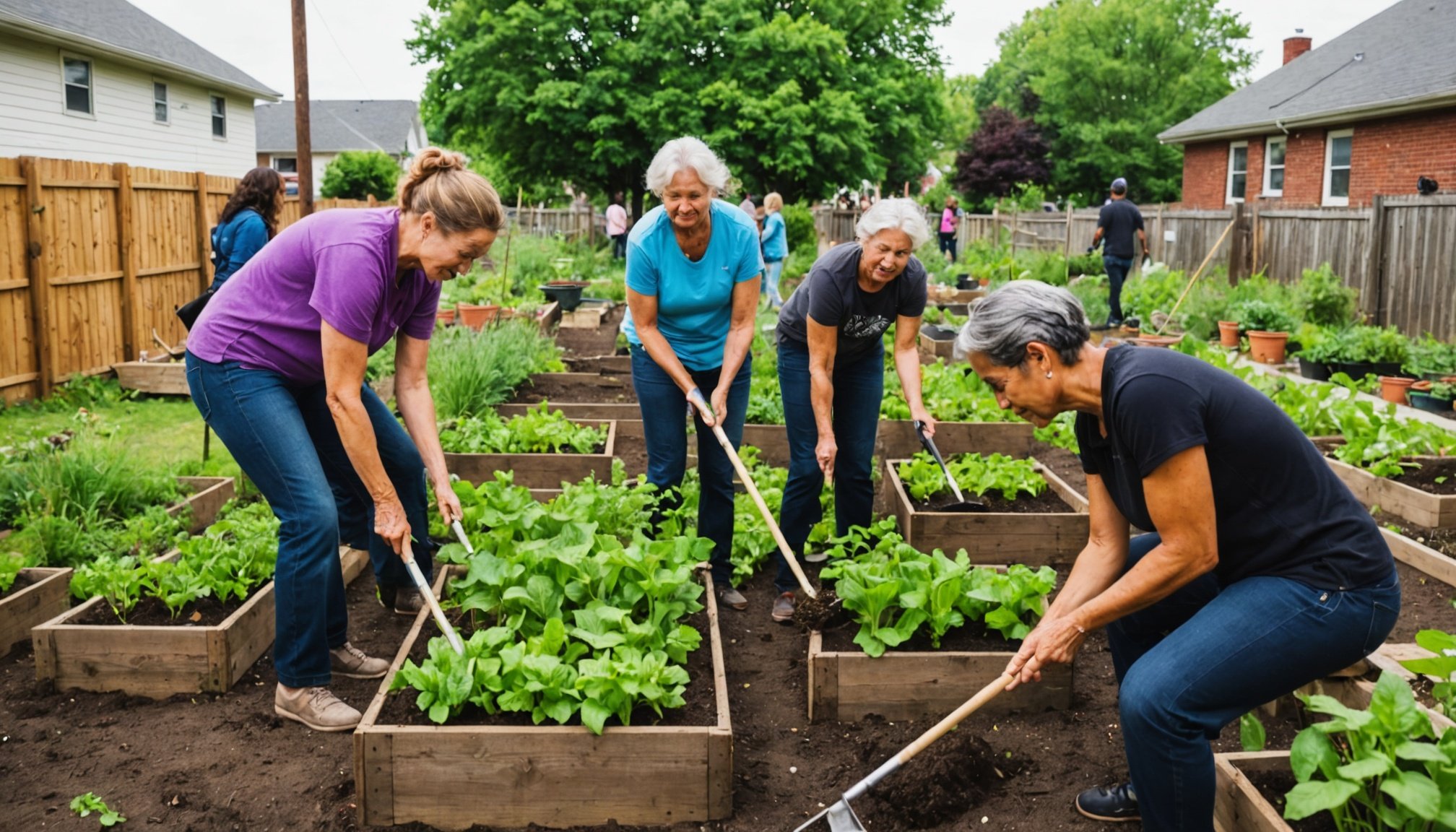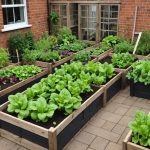Unlocking Urban Serenity: The Transformative Power of Community Gardening for Mental Wellness
In the hustle and bustle of urban life, finding serenity and tranquility can seem like an impossible task. However, there is a powerful tool that can help you reconnect with nature and improve your mental wellness: community gardening. This article delves into the numerous benefits of community gardening, from its impact on mental health to its role in fostering community connections and enhancing the quality of life in urban environments.
The Mental Health Benefits of Community Gardening
Community gardening is more than just a hobby; it is a therapeutic activity that can significantly improve your mental health. Here are some of the key ways in which gardening can benefit your wellbeing:
In the same genre : Natural vs. Synthetic Vitamins: How Do They Influence Your Health?
Reducing Stress and Anxiety
Gardening is known to reduce stress and anxiety by providing a calming and structured environment. The physical act of gardening, such as watering, weeding, and planting, can create a soothing rhythm that helps alleviate stress. Research has shown that engaging in gardening activities can lower cortisol levels, the hormone associated with stress, and increase the production of serotonin, a hormone that promotes positive feelings[4].
“Getting your hands dirty in the garden can increase your serotonin levels – contact with soil and a specific soil bacteria, Mycobacterium vaccae, triggers the release of serotonin in our brain,” notes a study published in the journal Neuroscience[2].
Also to read : Finding the right eating disorder counsellor in London
Improving Mood and Cognitive Function
Interacting with plants has been linked to enhanced mood and emotional well-being. Studies have found that participants who worked in environments enriched with greenery reported higher levels of happiness and life satisfaction. Additionally, exposure to natural elements can improve focus and concentration, leading to increased productivity[4].
Gardening also stimulates the growth of memory-related nerves in the brain, which can be particularly beneficial for individuals with conditions like dementia. A study in Korea involving patients with dementia showed an increase in brain nerve growth factors associated with memory after engaging in gardening activities[1].
Creating a Sense of Purpose and Accomplishment
Gardening provides a sense of purpose and accomplishment, which is crucial for mental wellbeing. The act of nurturing plants and watching them grow can be incredibly fulfilling, offering a sense of achievement and pride in one’s work.
“As the saying goes, ‘A Sunday well spent brings a week of content.’ What better way to spend your Sunday than in the garden with a good book and a refreshing drink?” This sentiment highlights the satisfaction and contentment that gardening can bring[1].
Fostering Community Connections
Community gardening is not just about individual benefits; it also plays a significant role in fostering community connections and social bonds.
Building Social Connections
Gardening with others is a wonderful way to build social connections and bring people together. Community gardens are filled with helpful individuals who share their knowledge, time, and even plants with newcomers. This shared activity provides opportunities to form new friendships, engage in recreational activities, and learn from experienced gardeners[1].
“Community gardening has been shown to improve mental health and well-being, as well as foster positive relationships within the community,” notes an article from Abbeyfield. This highlights the social benefits that extend beyond the individual to the community as a whole[1].
Enhancing Family Dynamics
For families, gardening can be a therapeutic activity that strengthens bonds. Planting and nurturing a garden together encourages teamwork, communication, and a shared sense of accomplishment. This can be particularly beneficial in family therapy programs, where such activities can enhance family relationships and facilitate healing[4].
The Role of Biophilic Design in Urban Gardens
Biophilic design, which incorporates natural elements into urban spaces, is crucial for creating serene and beneficial community gardens.
Integrating Natural Elements
Biophilic design involves bringing the natural world into urban environments. This can include incorporating green spaces, water features, and natural materials into garden design. Such designs not only enhance the aesthetic appeal of gardens but also provide numerous health benefits.
“Exposure to natural elements can improve focus and concentration, leading to increased productivity,” according to a study by the University of Michigan. This underscores the importance of integrating natural elements into urban garden designs[4].
Improving Air Quality and Urban Living
Urban gardens can significantly improve air quality and the overall quality of life in urban areas. By providing green spaces, these gardens help absorb pollutants and produce oxygen, making the air cleaner and healthier to breathe.
Here is a comparison of the benefits of traditional and biophilic garden designs:
| Benefit | Traditional Garden Design | Biophilic Garden Design |
|---|---|---|
| Air Quality | Limited impact on air quality | Improves air quality by absorbing pollutants and producing oxygen |
| Mental Health | Reduces stress and anxiety | Enhances mood, reduces stress, and improves cognitive function |
| Social Connections | Fosters some social connections | Encourages strong community bonds and social interactions |
| Aesthetic Appeal | Focuses on plant arrangement | Incorporates natural elements like water features and natural materials |
| Health Benefits | Provides some health benefits | Offers comprehensive health benefits including improved air quality and reduced stress |
Practical Insights and Actionable Advice
If you are interested in starting or joining a community garden, here are some practical insights and actionable advice to get you started:
Choosing the Right Location
When selecting a location for your community garden, consider accessibility, sunlight, and soil quality. Ensure that the location is easily accessible for all members of the community and receives adequate sunlight for plant growth.
Selecting the Right Plants
Choose plants that are suitable for your climate and the level of care you can provide. Leafy greens, herbs, and certain vegetables like tomatoes and peppers are great options for beginners. Here is a list of plants that thrive in community gardens:
- Leafy Greens: Lettuce, spinach, kale
- Herbs: Basil, mint, rosemary
- Vegetables: Tomatoes, peppers, cucumbers
- Flowers: Sunflowers, zinnias, marigolds
Building Community Engagement
To foster community engagement, organize regular meetings and events. This could include workshops on gardening techniques, potluck dinners, or simply weekly gardening sessions where members can share tips and advice.
Incorporating Hydroponic Gardening
For those interested in year-round cultivation, consider incorporating hydroponic gardening techniques. Hydroponic systems like Fork Farms Flex Farm provide a controlled environment that minimizes common gardening frustrations and ensures consistent plant growth regardless of the season[3].
Community gardening is a powerful tool for unlocking urban serenity and improving mental wellness. By providing a calming environment, fostering social connections, and integrating natural elements into urban spaces, community gardens offer a multitude of benefits that enhance the quality of life.
As Robyn Francis, a permaculturist and gardener, aptly puts it, “Enjoy the garden, fresh organic food and make sure you have fun playing in the dirt on a regular basis.” This simple yet profound advice encapsulates the transformative power of community gardening in urban environments[2].
So, whether you are looking to reduce stress, improve your mood, or simply connect with nature and your community, community gardening is an excellent way to achieve these goals. Start digging, and you might just find that the serenity you’ve been seeking has been right in your backyard all along.











